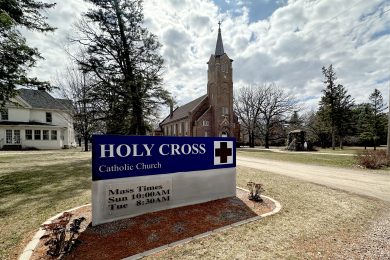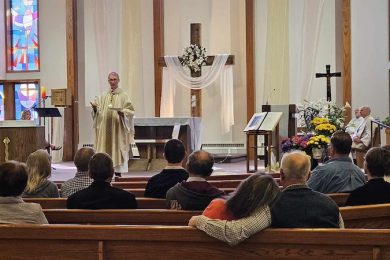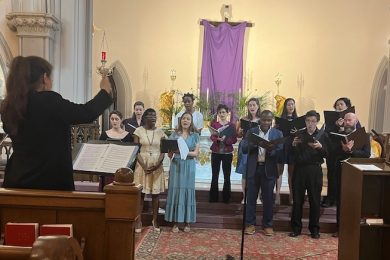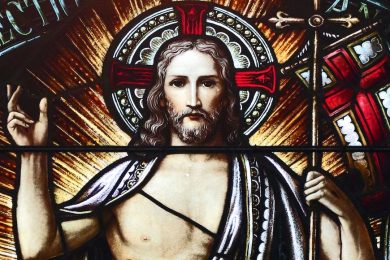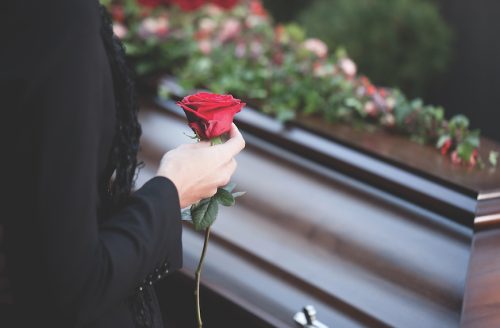I couldn’t tell you the largest funeral at which I presided, but I vividly recall the smallest: the funeral director, a grandniece, one parishioner and I.

I had never met this gentleman, whom I’ll call Andrew. He had fled civil unrest in his country some 50 years before. For political reasons, his wife did not come to the United States, and he refused to return to his homeland. Andrew never saw her or the rest of his family again.
Two lasting lessons remain with me from that funeral Mass. First, it struck me that the Church uses the same funeral rites for everyone. While there are various options that reflect the uniqueness of each journey of faith, the essential rites do not differ, underscoring that God plays no favorites (Acts 10:34, Romans 2:11, Galatians 2:6). It matters not how prominent or obscure, how wealthy or poor, how old or young, how educated or unread, how cherished or neglected by others. In the eyes of God, each life is of infinite value, and a place is prepared for every person in the Father’s house, as Jesus assures us (John 14:2).
This is part of the symbolism of the funeral pall that covers the casket of the baptized: We are all clothed in Christ and “there is neither Jew nor Greek, neither slave nor free person, neither male or female; for you are all one in Christ Jesus” (Galatians 3:28). Our human differences are not negated, but they are not barriers — nor leverage — to sharing the one divine life opened for us in the cross and resurrection of Jesus.
The second lesson was the generosity of that parishioner there with us. She did not know this man, either. There was no luncheon, no eulogy, no favorite songs (in fact, I think we had no music at all). She was just there to do a corporal work of mercy and pray for a man she had never known, but whom she recognized as a brother in the family of God. Professionals and volunteers who work in this field — funeral directors, liturgists, florists, those who maintain cemeteries and make meals, and so many others — share in this work of mercy and quietly witness to the value of every human life.
Increasingly, obituary columns are populated with “celebrations of life,” presented as a gathering with “more meaning than a traditional funeral” (as one Kentucky funeral home website says).
It is certainly important to honor the distinct individuality of each person. As St. John Paul noted in his first Christmas message: “For God and before God, the human being is always unique and unrepeatable, someone thought of and chosen from eternity, someone called and identified by his own name.” Memories and stories of each “someone” can personalize our gratitude for that life and inspire us to learn from and imitate their virtues and sacrifices.
While a “celebration of life” inherently looks back on a life now ended, the Christian funeral does that but much more. Our rites intentionally engage the whole range of time. We acknowledge the past that was. But we also pray in the present — attentive to the grief, family and community support, and faith of the people who are affected by this death. And, most of all, we rejoice in the horizon of the future, and the promise of eternal life rooted in the redemptive love of God and the mystery of the Lord’s cross and resurrection.
[perfectpullquote align=”right” bordertop=”false” cite=”” link=”” color=”” class=”” size=”14″]While a “celebration of life” inherently looks back on a life now ended, the Christian funeral does that but much more. [/perfectpullquote]
Hundreds of times, I have relied on 1 John 3:1-2 at the vigil services ahead of the funeral: “See what love the Father has bestowed on us, that we may be called the children of God! Yet so we are. … Beloved, we are God’s children now. What we shall be has not yet been revealed. We do know that when it is revealed, we shall be like him, for we shall see him as he is.”
Two things stand out here. First, we are always children of God; this is our fundamental identity and dignity. Regardless of the particular details of each biography, each person is created by Love, in love, and called home to that same Love. We recognize that we do not always live in the image of God, and so the Church’s funeral rites are not a canonization or a declaration of glory achieved; they also petition for divine mercy to bring our loved ones to glory.
In our funerals, we do not judge the person’s life, but we do acknowledge their infinite worth as a child of God, and our common hope in the infinite mercy of God. It is charity to pray for one another, even beyond the veil of human dying.
Second, we hear those four words in the center of that reading: “what we shall be.” It is a simple declaration that when our earthly pilgrimage is complete in God’s eyes, there is not only a past to be remembered. A future is prepared for us, a future that the God “who delights in clemency” (Micah 7:18) desires to share with us. That future promises the healing of all our wounds, the consolation of all our sorrows, the end of all our sufferings and fears, the restoration of all our losses. We cannot adequately describe it or even properly long for it: “Eye has not seen, ear has not heard, nor has it entered the human heart, what God has prepared for those who love him” (1 Corinthians 2:9).
Legendary New York Yankees’ catcher and coach Yogi Berra famously said: “Always go to other people’s funerals; otherwise they won’t come to yours.” Like many of his quotes, there was a tongue-in-cheek wisdom hidden beneath the apparent humor. I can’t speak to Yogi’s faith convictions, but this quip appeals to our human compassion to support others in their sorrows and our divine faith that death does not end our relationships; it simply changes them. In Christ, we look not only to the past, but also to a future in the fullness of life. More than just a social courtesy, funerals are an act of resurrection faith, undaunted hope and living charity.
May Andrew, and all the faithful departed, through the mercy of God, rest in peace.
Father Tom Knoblach is pastor of Sacred Heart in Sauk Rapids and Annunciation in Mayhew Lake. He also serves as consultant for health care ethics for the Diocese of St. Cloud.
Top photo: Bigstockphoto.com

